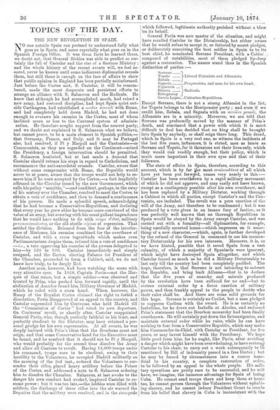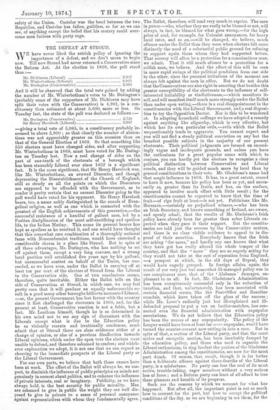TOPICS OF THE DAY.
THE NEW REVOLUTION IN SPAIN.
1V0 one outside Spain can pretend to understand fully what 1.1 goes on in Spain, and more especially what goes on in the Spanish Foreign Office. It was from facts he learned there, we doubt not, that General Sickles was able to predict so cer- tainly the fall of Castelar and the rise of a Serrano Ministry ; and the whole history of the recent events will, we feel as- sured, never be known until some indiscreet diplomatist reveals them, but still there is enough on the face of affairs to show that public opinion in England has been partially misinformed. Just before the Cortes met, S. Castelar, it will be remem- bered, made the most desperate and persistent efforts to arrange an alliance with S. Salmeron and the Radicals. He knew that although he had accomplished much, had raised a new army, had restored discipline, bad kept Spain quiet out- side Carthagena, had established a modus vivendi with Rome, and had completely held down Madrid, he had not done enough to overawe his enemies in the Cortes, most of whom inclined more or less to the Cantonal system of adminis- ration. He therefore sought support from the nearest party, and we doubt not explained to S. Salmeron what we believe, but cannot prove, to be a main element in Spanish politics,— that Germany, France, and Italy, and it may be Portugal also, had resolved, if Pi y Margall and the Cantonists—or Communists, as they are regarded on the Continent—seized the Presidency, a foreign intervention should be permitted. S. Salmeron hesitated, but at last made a demand that Castelar should retrace his steps in regard to Catholicism, and recommence the anti-sacerdotal crusade. Castelar, aware that without some compromise with Rome, the Republic would never be at peace, aware that the troops would not help to re- move him if he were accepted by the Cortes,—a fact implicitly affirmed in the Circular issued by the new Government, which calls his policy "sensible,"—and confident, perhaps, in the sway of his oratory over the Chamber, resolved to meet the Cortes, to obtain a vote of confidence, and then to demand a continuance of his powers. He made a splendid speech, acknowledging that he had become a Conservative-Republican, and declaring that every year he grew older he became more convinced of the value of an army, but avowing with his usual gallant imprudence that he would have nothing to do with coups d'e'tat, military pronuncionnientos, or the old sterile re'gime of repression. That settled the division. Released from the fear of the interfer- ence of Moriones, his enemies combined for the overthrow of Castelar, and with a crass ingratitude which makes even Parliamentarians despise them, refused him a vote of confidence —i.e., a vote approving his exercise of the powers delegated to him—by 120 to 300. Castelar immediately and simply resigned, and the Cortes, electing Palanca for President of the Chamber, proceeded to form a Cabinet, said, we do not know how truly, to be deeply Red.
Another man, however, bad been watching the scene with very attentive eyes. In 1868, Captain Pavia—not the Mar- quis of that name, but a simple soldier—was observed and trusted by Prim, who pushed him forward rapidly, until the abdication of Amadeo found him Military Governor of Madrid, which he ruled with a stern hand. When, however, the Rump of the Royalist Cortes claimed the right to forbid a dissolution, Pavia disapproved of an appeal to the country, and Castelar superseded him by Contreras, who held Madrid till the "Commission of Cortes" had voted its own departure. On (Jontreras' revolt, or shortly after, Castelar reappointed General Pavia, who, though perfectly faithful to his trust, and perfectly obedient to the Dictator, may have retained a per- sonal grudge for his own supersession. At all events, he was deeply imbued with Prim's ideas that the Bourbons must not reign, and that some Conservative head for the Executive must be found, and he resolved that it should not be Pi y Marge% who would probably for the second time dissolve the Army and allow all Cantons to revolt. Having 14,000 troops under his command, troops sure to be obedient, owing to their hostility to the Volunteers, he occupied Madrid militarily on the morning of the 3rd inst., ordered the Volunteers to sur- render their rifles, placed heavy artillery before the Palace of the Cortes, and addressed a note to S. Salmeron ordering him to dissolve the-Chamber. Salmeron, at last awake to the danger his own conduct had evoke, implored Castelar to re- sume power : but it was too late,—the lobbies were filled with soldiers, the discharge of three rifles into the air warned the Deputies that the military were resolved, and in the stampede which followed, legitimate authority perished without a blow 'on its behalf.
General Pavia was now master of the situation, and might have recalled Castelar to the Dictatorship, but either aware that he would refuse to accept it, or fettered by secret pledges, or deliberately conceiving the best soldier in Spain to be its best chief, he nominated Serrano President, with a Cabin( composed of notabilities, most of them pledged lip-deep against a restoration. The names stand thus in the Spanish distinction of parties :- Serrano Topete }Liberal Unionists and Alfonsists. Zabala Sagasta Progressista, and man for his own hand.. Figuerola Bieerra Radicals. Eebegarray Garcia Lopez...Unitarian-Republican.
Except Serrano, there is not a strong Alfonsist in the list, for Topete belongs to the Montpensier party ; and even if we credit him, Zabala, and Sagasta with an arrare pensk the Alfonsists are in a minority. Moreover, we are told that Serrano was profoundly moved by the manner of Prinfis death, and convinced that a power with which it is most difficult to deal has decided that no king shall be brought into Spain by anybody, or shall reign there long. This dread, which in Spain is a very real one, as witness the incidents of the last five years, influences, it is stated, men as brave as Serrano and Topete, for it threatens not their lives only, which they would risk readily enough, but their policy, which is much more important in their own eyes and that of their followers.
The state of affairs in Spain, therefore, according to this account, which is by far Uhe most vraisemblant of all which have yet been put forward, comes very nearly to this :- Castelar has been overthrown by a rapid military movement. of which he did not approve, and may easily not have known, except as a contingency possible after his own overthrow, and has been replaced by a Military Dictator, working through a Cabinet in which all parties, except Castelar's and the Can- tonists, are included. The revolt was a pure exertion of the will of the Army, and therefore to be condemned ; but it was. produced by a vote given in an insane fury of faction, as it was perfectly well known that no thorough Republican in Spain would be obeyed by the Army except Castelar, and was carried out with a formality—all diplomatists, for example, being carefully escorted home—which impresses on it some- thing of a new character,—which, again, is further developed by the refusal of the General in command to use his momen- tary Dictatorship for his own interests. Moreover, it is, as we have hinted, possible that it saved Spain from a vast calamity, of which a majority of Spaniards were ignorant, which might have destroyed Spain altogether, and which Castelar feared as much as he did a Military Dictatorship to last only till the country had been completely pacified. The hope, therefore, is that Serrano is not intending to subvert the Republic, and bring back Alfonso—that is, to declare that the five years of anarchy and misrule produced by the revolution have been suffered for no end—but to restore external order by a fierce exertion of military power, and then frankly appeal to the people to decide who their ruler shall be. And there are some solid grounds for this hope. Serrano is certainly no Carlist, but a man pledged to suppress Carlism with the sword. He is as certainly no Isabellino, for he drove out Isabella at Alcolea, and endorsed Prim's statement that the Bourbon monarchy had been finally overthrown. He will certainly put down the Intransigentes, and maintain external order while he rules, while he can have nothing to fear from a Conservative Republic, which may make him Commander-in-Chief, with Castelar as President, for five years, or may invest himself with the Presidency. We hope little good from him, for he ought, like Pavia, after avoiding a danger which might have been overwhelming, to have restored Castelar to his chair, to carry out a work subsequently to bb sanctioned by Bill of indemnity passed in a free Cortes ; but he may be forced by circumstances into a course bene- ficial to his country, a complete restoration of order, to be followed by an appeal to the whole people. His mili- tary operations are pretty sure to be successful, and he will have, we imagine, the immense advantage for Spain of losing Cuba. He cannot send troops there and keep them at home too, he cannot govern through the Volunteers without uphold- ing slavery, and he cannot induce President Grant to recede from his belief that slavery in Cuba is inconsistent with the safety of the Union. Castelar was the bond between the two Republics, and Castelar has fallen, guiltless, so far as we can see, of anything except the belief that his oratory could over- come men furious with party rage.



































 Previous page
Previous page